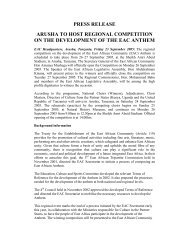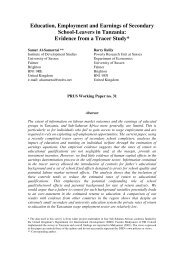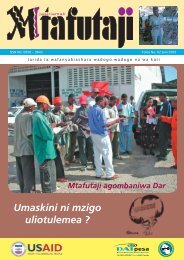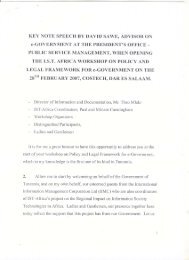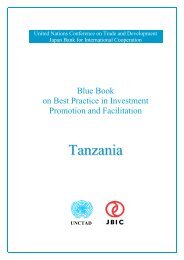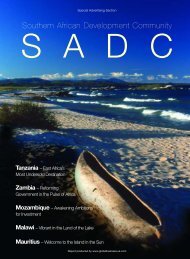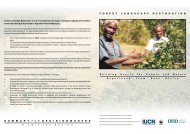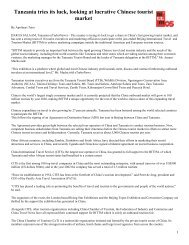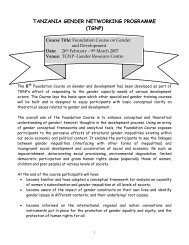The Girl-Child and Government Service Provision.pdf - Tanzania ...
The Girl-Child and Government Service Provision.pdf - Tanzania ...
The Girl-Child and Government Service Provision.pdf - Tanzania ...
- No tags were found...
Create successful ePaper yourself
Turn your PDF publications into a flip-book with our unique Google optimized e-Paper software.
<strong>Girl</strong>-<strong>Child</strong> Accessto <strong>Government</strong> Social <strong>Service</strong>sin <strong>Tanzania</strong>Zabdiel Kimambo <strong>and</strong> World Vision <strong>Tanzania</strong>Introduction <strong>and</strong>backgroundResearch backgroundIn order to evaluate the issue of girl children’s access togovernment service provision, some general backgroundis required. This section addresses that need.<strong>Government</strong> services at the community level, such as localhealth <strong>and</strong> education, were affected in many countriesby the processes of structural adjustment <strong>and</strong> economicreform. Quality of services declined <strong>and</strong> provision wasoften cut in order to reduce government budget deficits.Where services were not cut, governments often lackedthe resources for increased investment, <strong>and</strong> in some countriesthis has led to a growing role for NGOs <strong>and</strong> otherinstitutions to provide services.In the last few years there has been a return to emphasisinggovernment service provision on the part of donors<strong>and</strong> also the World Bank/International Monetary Fund(IMF). <strong>The</strong>se outside bodies have pressed governments toincrease social service provision <strong>and</strong> to improve quality.This trend includes the requirement on recipient countriesto produce Poverty Reduction Strategy Papers(PRSPs). Donors <strong>and</strong> the World Bank/IMF also claim thatthe privatisation of some services (such as water) will improvelocal access <strong>and</strong> the quality of provision.<strong>The</strong> new emphasis on social-service provision is likely tobring a great deal of attention to bear on the failure ofthose services. Many stories of corruption <strong>and</strong> inefficiencyhave led to criticism of governments, donors <strong>and</strong> internationalfinancial institutions. <strong>The</strong> problems of service provisionare very complex, however, with problems arisingfrom many causes. It is therefore important to look at thesituation “on the ground” <strong>and</strong> to gain an accurate pictureof how the poor are able to access <strong>and</strong> use local services,particularly health <strong>and</strong> education.<strong>Child</strong>ren in <strong>Tanzania</strong><strong>Tanzania</strong> has made important improvements in recentyears in maintaining relative stability <strong>and</strong> improving macroeconomicperformance. <strong>The</strong> annual growth rate reached5.6 per cent in 2001 <strong>and</strong> was projected to rise to 5.9per cent in 2002 despite substantial losses in the terms oftrade. According to TASOET—the <strong>Tanzania</strong> Social EconomicTrust—the rate of inflation was reduced from 30.2per cent in 1981 to 5.9 per cent in 2000. <strong>Government</strong> revenueshave increased, <strong>and</strong> public expenditures have beenbetter controlled. Debt relief has been secured throughthe Highly Indebted Poor Countries (HIPC) initiative,which is intended to make additional resources availablefor poverty reduction. <strong>The</strong> government has articulated thecountry’s key development priorities <strong>and</strong> strategies in thePRSP which places special emphasis on improving education,health, water, roads, agriculture <strong>and</strong> good governance– areas that are critical to children’s well-being(UNICEF 2001).<strong>Tanzania</strong>’s macro developments are important achievements.But they have yet to be translated into concreteimprovements in the lives of many poor <strong>Tanzania</strong>n children.At the beginning of the twenty-first century <strong>and</strong>Zabdiel Kimambo was Advocacy Officer with World Vision <strong>Tanzania</strong> <strong>and</strong> continues to work in <strong>Tanzania</strong> in the NGO sector.<strong>The</strong> <strong>Girl</strong>-<strong>Child</strong> <strong>and</strong> <strong>Government</strong> <strong>Service</strong> <strong>Provision</strong> 29



